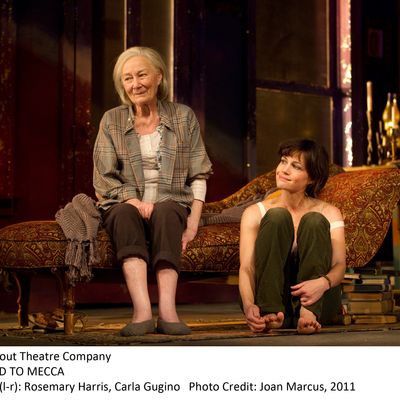Rosemary Harris and Carla Gugino in ‘The Road to Mecca.’
Photo: Joan Marcus
The Road to Mecca, a late-career work by South African playwright Athol Fugard, is an odd choice for a Broadway revival — a square peg in an 800-seat hole. Which makes it an all-too-natural choice for the Roundabout’s American Airlines mainstage, home of the Dehydrated Play in a Big Rattling Box. The combined efforts (and boy, do they feel like efforts) of such top-flight talents as Rosemary Harris, Jim Dale, and the underutilized Carla Gugino are not enough to congeal Mecca — a challenging, elusive play under the best of circumstances, at once diffuse and idiosyncratic, as dramatically cramped as it is structurally gaseous. Under the direction of Gordon Edelstein, the show doesn’t reach us as a focused theatrical performance at all, but rather as a sort of mild incense wafted through the AA’s vast, cold vacuum.
The problems begin on the page. For nearly all of Act 1, we hear almost exclusively from Elsa (Gugino), a progressive schoolteacher who’s driven hundreds of miles nonstop from Cape Town into the bush to check on her godmotherly old friend, an introverted Afrikaaner called Miss Helen (Harris). Helen’s a sweet old crank with a long-dead husband, a pushy drop-in pastor named Marius (Dale), and a sculpture garden full of her handmade folk-art oddities, all pointed east. (Fugard based the character and setting on an actual artist-iconoclast named Helen Martins, whose “Owl House” in Nieu-Bethesda became a museum after her 1976 suicide.) Elsa’s come to check on her, and to outrun some of her own personal demons back in Cape Town. But Elsa’s emotional baggage seems to have been sent on ahead: Even as she rushes to save Miss Helen — who wrote Elsa a disturbing, despairing letter, crying for help — she peevishly punishes the older woman for making her worry about her in the first place, then steadily catechizes her (and the audience) with her personal grievances and disappointments. They can’t help sounding petty next to Miss Helen’s predicament: the threat of eviction, institutionalization, and madness. (Though, honestly, you’d never know it from the downy-soft way Harris has been costumed and directed. She looks more likely to give you a Werther’s Original and a pat on the head than to be a defiant earth-mother declamation on the sanctity of the inner self.)
For her part, Gugino, a talented and perennially underrated actress, searches for a sympathetic approach to her character, but I’m not sure it’s the right strategy: Elsa, for all her good intentions, is an irretrievably unpleasant person, at a point in her life where even her finest acts are mostly driven by bitterness and guilt. Something scalding is called for, and Gugino and Edelstein instead serve us tea and noncommittal, room-temperature empathy: Elsa, as a character, often feels like an older man’s rambling best-guess representation of the troubles of a younger, single woman. But it adds up to little than more than an extremely self-involved-seeming individual who, for obscure reasons, simply won’t shut up long enough to have a proper conversation. (Actually, there is a reason, the worst reason of all: Fugard has stuffed her with unwieldy exposition, and disgorging it all takes time.) Harris simply looks on beatifically, waiting her out, and we wait nearly an hour for a real play to begin. Spoiler: That doesn’t actually happen until the end of Act 1, when the long-foreshadowed Marius belatedly appears, and something, finally, is at stake.
What’s at stake is Miss Helen’s liberty and the fate of her house, a shanty-of-dreams that is supposed to evoke a ramshackle outpost at the edge of sanity and civilization, but is here rendered by Michael Yeargan as some kind of comfy, shabby-chic Santa Fe pottery studio. It’s spacious — it has to be, on a stage that enormous — and funky-plush, the sort of place your artsy, with-it single aunt would buy shortly after striking oil. “This is my world,” Miss Helen tells Marius deep in the second act, as she lights a constellation of candles and reveals the ground glass worked into the walls, the system of mirrors she’s created, the wonder of the sacrosanct inside of her own cloistered mind. “I have banished darkness from it.” Wisely, we’re not shown the sculptures outside — the Magi, the owls — but we know they disquiet conservative Marius as much as they delight Miss Helen: They are the pantheon of her private inner faith, her panic room against the moral pollution of conventional South African society. And their eastward orientation indicates that her epiphanies rise in a different sky. It’s a beautiful image, a beautiful speech, and Harris delivers it, yes, beautifully. But like a star exploding in a distant black expanse, its illumination seems to take forever to reach us. Everyone and everything feels too far apart in this Mecca; actors can’t seem to get a firm grip on one another and nothing ever feels the least bit urgent. Fugard’s most celebrated works — Blood Knot, Master Harold and the boys — were forged in the moral smelting pit of apartheid, and every choice, every conflict, every moment is prodded along by emergent violence and threat, even the airiest lyric digressions. Mecca is a conscious departure, almost (as Frank Rich wrote in 1988, when the play had its New York premiere at the Promenade, starring Yvonne Bryceland and Amy Irving) a career retrospective. Perhaps that accounts for its omnibus structure, its litanies of images and ideas. Mecca reads much better than it shows. It might’ve missed its calling as a closet drama. Instead, it’s been abandoned in a great, big barn. When Miss Helen lights her candles, what they reveal, for the most part, is surplus square footage.
The Road to Mecca is at the Roundabout Theatre Company’s American Airlines Theatre through March 4.
Theater Review: The Road to Mecca





